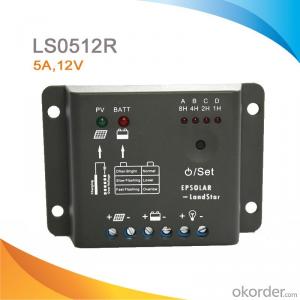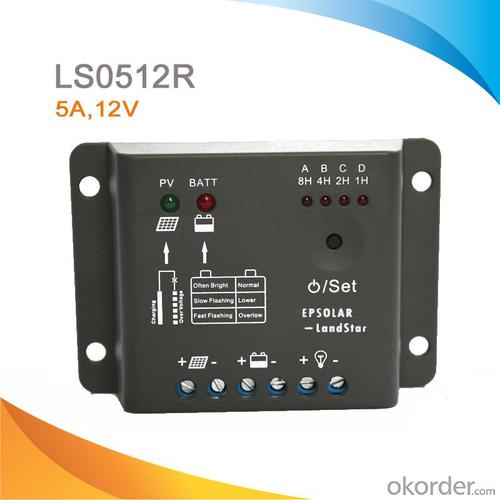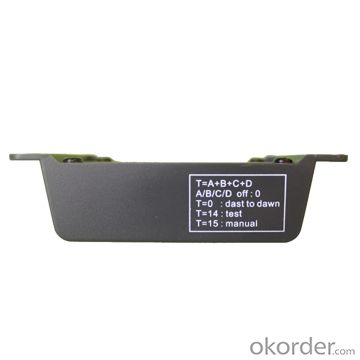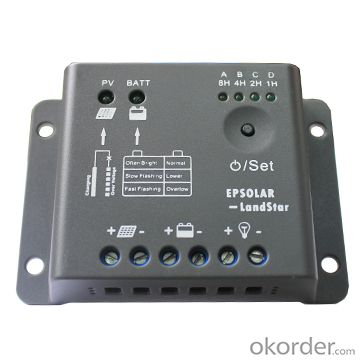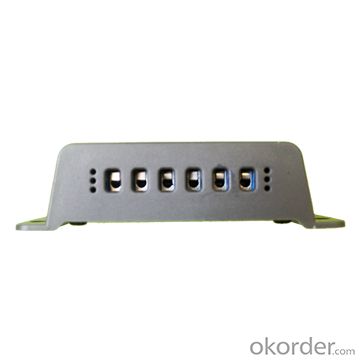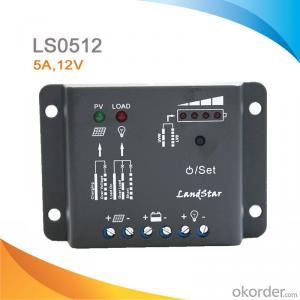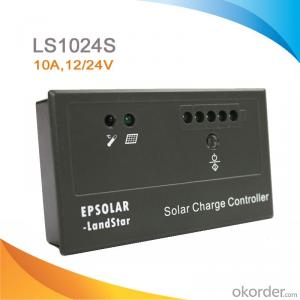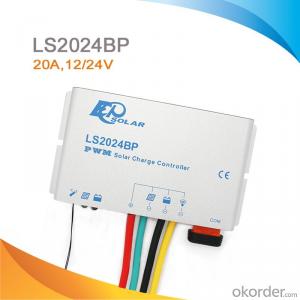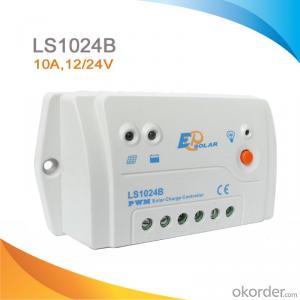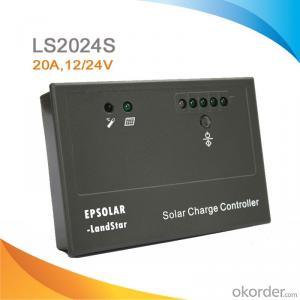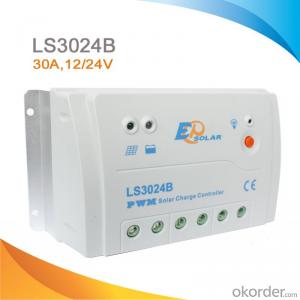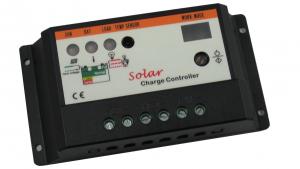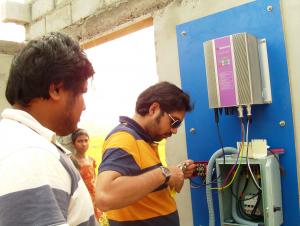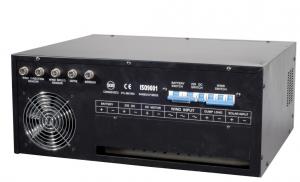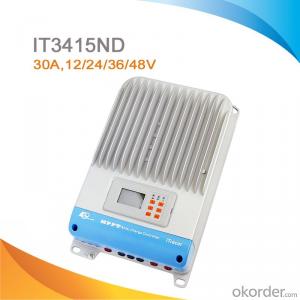Resol Solar Heating Controllers PWM Solar Lighting Regulator 5A, 12V, LS0512R
- Loading Port:
- China Main Port
- Payment Terms:
- TT or LC
- Min Order Qty:
- -
- Supply Capability:
- -
OKorder Service Pledge
OKorder Financial Service
You Might Also Like
Descriptions
Our solar controllers are designed for solar home system, ideal for rural electrification systems, and many advantages compared to other controllers: Ideal for small off-grid solar lighting system that needs light and timer control.
Features:
·High efficient Series PWM charging, increase the battery lifetime and improve the solar system performance.
·Use MOSFET as electronic switch, without any mechanical switch
·Widely used, automatically recognize day/night.
·Only one key solve all setting simply
·Intelligent timer function with 1-12 hours option
·Adopt temperature compensation, correct the charging and discharging parameters automatically and improve the battery lifetime.
Electronic Protections:
·over charging
·over discharging
·overload
·short circuit
·Reverse protection for battery
Specification:
Electrical parameters | LS0512R |
Nominal System Voltage | 12VDC |
Rated Battery Current | 5A |
Max. Battery Voltage | 16V |
Charge Circuit Voltage Drop | ≤0.26V |
Discharge Circuit Voltage Drop | ≤0.15V |
Self-consumption | ≤6mA |
Overall dimension | 97 x 66x 25mm |
Terminal | 2.5mm2 |
Net weight | 0.05kg |
Working temperature | -35℃ to +55℃ |
Humidity | 10%-90% NC |
Enclosure | IP30 |
Battery Voltage Parameters (temperature at 25℃) | |
Battery charging setting | Sealed |
Equalize Charging Voltage | 14.6V |
Boost Charging Voltage | 14.4V |
Float Charging Voltage | 13.8V |
Low Voltage Reconnect Voltage | 12.6V |
Low Voltage Disconnect Voltage | 11.1V |
Equalize Duration | 2 hours |
Boost Duration | 2 hours |
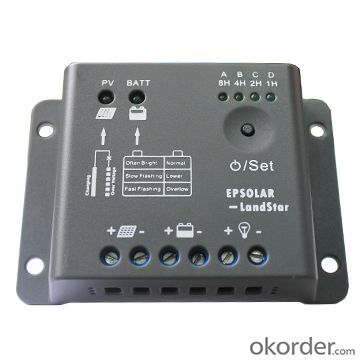
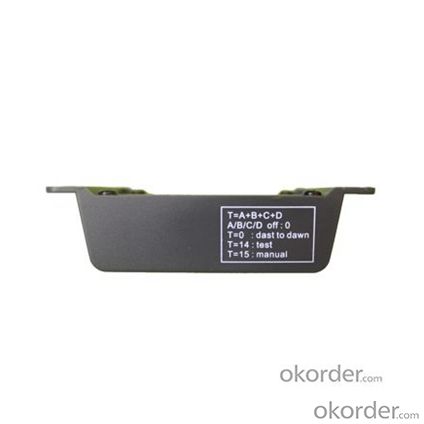
- Q: How does a solar controller handle temperature fluctuations?
- A solar controller handles temperature fluctuations by continuously monitoring the temperature of the solar panels. It adjusts the charging voltage and current to optimize the efficiency and performance of the solar panels according to the temperature. This helps to protect the panels from overheating in hot conditions and ensures maximum power output in colder temperatures.
- Q: Can a solar controller be used with a solar-powered lighting system?
- Yes, a solar controller can be used with a solar-powered lighting system. A solar controller is responsible for regulating the flow of energy between the solar panels and the lighting system, ensuring optimal charging and preventing overcharging. It also provides additional features like monitoring battery levels and controlling lighting schedules, making it an essential component for efficient operation of a solar-powered lighting system.
- Q: Can a solar controller be used with solar-powered indoor manufacturing systems?
- Yes, a solar controller can be used with solar-powered indoor manufacturing systems. A solar controller is an essential component of a solar power system as it regulates the flow of electricity between the solar panels and the batteries, ensuring that the batteries are charged efficiently and preventing overcharging or damage to the system. In the case of solar-powered indoor manufacturing systems, the solar controller would still be necessary to manage the flow of energy from the solar panels to the batteries, even if the manufacturing processes are conducted indoors. The solar controller would help optimize the use of solar energy and ensure that the system operates smoothly and efficiently, regardless of the location of the manufacturing facility.
- Q: Can a solar controller be used with a solar-powered electric fence?
- Yes, a solar controller can be used with a solar-powered electric fence. The solar controller helps regulate the flow of electricity from the solar panels to the fence, ensuring that the fence is powered efficiently. It also helps monitor and maintain the battery charge to ensure consistent power supply.
- Q: Can a solar controller be used with solar panels of different technologies?
- Yes, a solar controller can be used with solar panels of different technologies. A solar controller acts as a middleman between the solar panels and the batteries or electrical loads, regulating the flow of energy. It is designed to work with various solar panel technologies, such as monocrystalline, polycrystalline, and thin-film, ensuring compatibility and efficient energy conversion regardless of the panel type.
- Q: How does a solar controller protect the battery from overcharging?
- A solar controller protects the battery from overcharging by monitoring the voltage level of the battery and adjusting the charging current accordingly. When the battery reaches a certain voltage threshold, which indicates that it is fully charged, the solar controller reduces or completely cuts off the charging current to prevent overcharging. This process is also known as the "float" or "trickle" charging stage. By regulating the charging process, the solar controller ensures that the battery remains at a safe and optimal charging level, extending its lifespan and preventing damage caused by overcharging. Additionally, some advanced solar controllers may also incorporate features like temperature compensation and equalization charging to further protect the battery from overcharging and ensure its long-term performance.
- Q: Can a solar controller be used with a solar pool heater?
- Yes, a solar controller can be used with a solar pool heater. A solar controller helps to regulate and optimize the operation of the solar pool heater by monitoring and adjusting the temperature and flow of the water. It allows for efficient and effective use of solar energy to heat the pool.
- Q: Can a solar controller be used with solar panels that are connected to a solar street light?
- Yes, a solar controller can be used with solar panels that are connected to a solar street light. A solar controller, also known as a charge controller, is an essential component in a solar power system that regulates the flow of electricity from the solar panels to the battery and prevents overcharging or over-discharging. In the case of a solar street light, the solar panels generate electricity during the day and charge the battery via the solar controller. The solar controller then ensures that the battery is charged to its optimal capacity and protects it from any damage caused by overcharging. During the night, the solar controller allows the battery to power the street light efficiently. Therefore, a solar controller is an integral part of a solar street light system to ensure proper charging and efficient use of solar energy.
- Q: How does a solar controller prevent voltage drops in the system?
- A solar controller prevents voltage drops in the system by regulating the flow of electricity from the solar panels to the battery. It ensures that the voltage remains constant and optimal by monitoring and adjusting the charging process. This helps to prevent overcharging or undercharging of the battery, which can lead to voltage drops and affect the overall performance of the system.
- Q: What is the difference between a solar controller and an inverter?
- The solar power system requires both a solar controller and an inverter, as they serve distinct purposes. The solar controller, also referred to as a charge controller or regulator, manages the flow of power between the solar panels and the batteries. Its primary role is to regulate the voltage and current from the solar panels to prevent overcharging or undercharging of the batteries. By doing so, it ensures that the batteries receive the ideal amount of charge, maximizing their efficiency and prolonging their lifespan. Solar controllers are typically utilized in off-grid or hybrid solar systems. Conversely, the inverter converts the direct current (DC) electricity generated by the solar panels or stored in the batteries into alternating current (AC) electricity. AC electricity is the type commonly used in household appliances and the power grid. In grid-tied solar systems, inverters are essential as they enable the solar-generated electricity to be fed back into the electrical grid. This reduces or eliminates the need for conventional electricity from the utility company. Additionally, inverters ensure that the AC power is in sync with the grid's frequency and voltage requirements. To summarize, the solar controller regulates battery charging and controls the power flow from solar panels to batteries, while the inverter converts DC electricity into AC electricity for use in homes or exportation to the grid. Both components have critical roles in a solar power system, ensuring optimal performance, efficiency, and compatibility with the electrical grid or off-grid arrangements.
Send your message to us
Resol Solar Heating Controllers PWM Solar Lighting Regulator 5A, 12V, LS0512R
- Loading Port:
- China Main Port
- Payment Terms:
- TT or LC
- Min Order Qty:
- -
- Supply Capability:
- -
OKorder Service Pledge
OKorder Financial Service
Similar products
Hot products
Hot Searches
Related keywords
